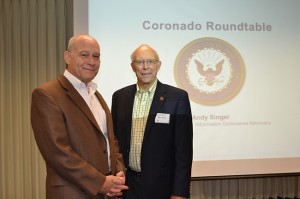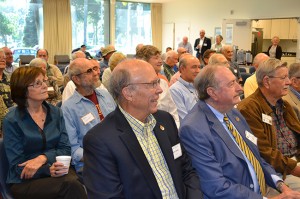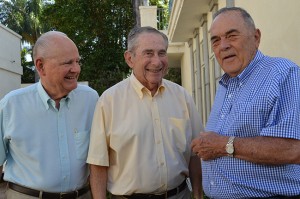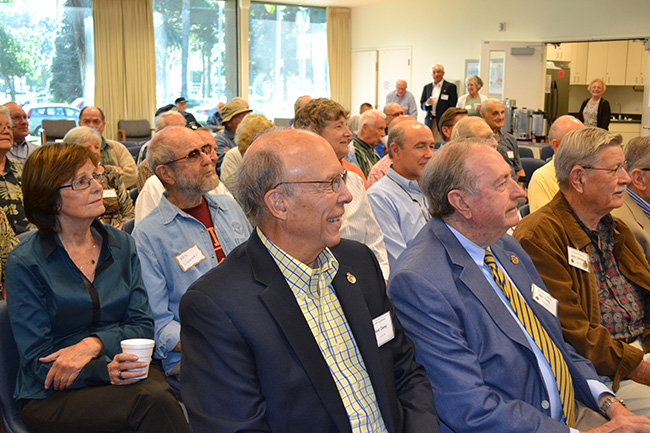Food for Thought
For 30 years, Coronado Roundtable has been serving up healthy discussions on national and world events
President Steve Clarey (Rear Adm., USN-Ret) opened the September meeting of the Coronado Roundtable with his usual dose of warm-up jokes.
“Here’s a bunch of old folks talking,” he teased his audience where the average age was north of 70:
“I would like to buy an Internet. Do you know how much it costs?”
“Will the Internet be open during the holidays?”
“We will be going on holiday for three months. Can you please suspend the Internet during my absence?”
“I have a problem with my Internet; does anyone know how to make the screen smaller?”
“I don’t have a computer at home. Is the Internet available in book form?”
Each line was met with lots of laughter by this group of Coronado retirees (and semi-retirees) who gather for monthly talks and camaraderie sponsored by Coronado Roundtable at the Coronado Library. In truth, these seniors not only know what the Internet is, they are among Coronado’s most educated, informed and, generally, “with-it” elders.
As the Coronado Roundtable celebrates its 30th anniversary this November, it has grown from an initial membership of eight to approximately 150. Nobody’s keeping a firm count, though, since it neither costs anything, nor is registration necessary to attend the nonprofit organization’s monthly meetings.
The group was the brainchild of Dr. Jerry Easton, a longtime Coronado optometrist. While participating in a house exchange in 1982 with a Rotarian family in Plymouth, England, Easton was invited by the local Rotary Club president and the area District Governor to a meeting of the Professional
and Businessmen’s Association. “The ‘Pro-Bus’ group allowed for lengthier presentations and extended question-and-answer periods with the speaker than was offered at Rotary Club meetings,” Easton noted, and he brought the idea of sponsoring the monthly talks back to Rotary Club of Coronado, but the board rejected it.
“They said they thought there were enough service clubs in Coronado,” Easton said. But Easton wasn’t ready to let go of the idea, believing the opportunity to engage in extended dialogue on topics of national and international interest would resonate with Coronadans. In fact, Easton and several Coronado businessmen had been meeting informally over lunch on Mondays for years at the former La Avenida restaurant, dubbing themselves in jest the “Unconcerned Citizens.”
In January 1983 Easton approached his friend Dr. Jay Mack, the superintendent of the Coronado Unified School District, and Dr. Paul Vetter, a Coronado dentist and former mayor. They in turn enlisted Brig. Gen. Ed Meyer (USMC-Ret) to serve as the group’s first chairman; Capt. Roy Mantz (USN-Ret) signed on to recruit members. Several organizational meetings were held at La Avenida, but it became apparent that a larger venue was needed, and the group moved to the Winn Room of the Coronado Library, concurrent with a welcoming of women into the ranks. Dr. Mona Campbell and Betty Berger were the first two women to sign up.
The steering committee adopted a constitution that was approved by the membership in November 1983. The following year, a second chairman was elected: Capt. Jim Miller was a Pearl Harbor survivor and Navy Cross holder; the crewmember of the ill-fated USS Arizona continued as chair through 1993. Subsequent chairs included Jack Phelan and the late Rear Adm. Joe Rizza. In 1999, the group reorganized from a steering committee into a formal board of directors and Mantz moved into the position of executive director (and is today a board member emeritus). Capt. Bill Green (USN-Ret) and Mike Dabbar have also served as president of the board and executive director respectively, and the two men teamed up in March 2011 to discuss Egypt and the Middle East.
Most meetings have about 75 people in attendance, but some speakers have brought in nearly double that amount, most notably Brian Bilbray in 1995, talking about his freshman year in Congress. That was the only meeting of the Roundtable that was moved to another site, the Coronado Middle School auditorium, to accommodate a larger audience.
After members converse over coffee for a few minutes, the meetings convene at 10 a.m. Speakers’ formal remarks generally run about 50 minutes, allowing for an in-depth presentation of their subject. After a short coffee break, the group reconvenes for another 30 minutes of questions and answers.
Clarey said that the roundtable has often pulled talent from the Coronado community such as Alex Butterfield, who grew up in Coronado and was a former deputy assistant to President Richard M. Nixon. It was Butterfield who, upon direct questioning by the Senate, disclosed the presence of a taping system in the Oval Office that eventually brought down a presidency.
“So many of our community members have led interesting lives and have great experience; like Bob Campbell, who was president of Sun Oil Company and Capt. George Galdorisi, co-author of ‘Act of Valor,’” Clarey said.
Among this year’s speakers were Coronado School Superintendent Dr. Jeffrey Felix on the state of education in Coronado, the state and the nation; “Dignified Transfer — Returning the Fallen from Afghanistan and Iraq,” presented by Lt. Cmdr. Charles Rowley of the U.S. Navy Chaplain Corps; “SANDAG — the other regional government,” presented by Clint Daniels, senior research analyst with SANDAG; and “Aging and Driving” presented by Dr. Linda Hill, a clinical professor in the department of Family and Preventive Medicine at UC San Diego.
Roundtable talks, in part, provide an insider’s perspective on some of the world’s most topical issues. Take the September talk, “Evolution of Intelligence in Modern Day Warfighting,” delivered by Rear Adm. Andrew Singer (USN-Ret). Singer, who retired in 2010 from the Navy, focused his remarks on the military’s new battlefield: cyberspace. He shared that the Department of Defense is setting up 40 cyber command centers around the world; two of which will shortly be in place at North Island Naval Air Station.
“Enemies come after us every day; they come after Wall Street and our communications structure,” Singer said of outside interests, stemming from individuals, terrorists and governments. He said that most cybercrime hits the private sector, with Macy’s department stores estimating a 1.7 percent annual loss from cybertheft. Still, Singer said the United States remains out in front of predators. “I’m not a believer in a digital Pearl Harbor, because the other guy has a to be a lot better than us, and we’re so far ahead.”
In July, Capt. Patrick Rabun (USN-Ret) presented an insider’s look at Guantanamo Bay. He bristled at what he termed the irresponsibility of the news media, citing one AP reporter who released photos in 2010 that were supposedly representative of Gitmo’s detention facilities. The photo in question had, in fact, been shot in 2002 at “Camp X-Ray,” the wire-fenced facility where detainees were first held while longer-term facilities were under construction. Today, at Camp Delta, prisoners are housed in eight different blocks and “They segregate themselves by how strictly they follow their religion,” Rabun said. “Some watch Baywatch; others, just Al Jazeera.”
Art, computer work (sans Internet access) and outside recreation are now among the detainee’s day-to-day activities, he said. “They love horseracing and soccer and hate baseball.” There are frequent lawyer visits — “Each meets an average of once or twice a month with their lawyer” — phone calls and mail, which are monitored.
America has had a base at Guantanamo since 1898, Rabun noted. Today, when people talk about “giving up the base,” Rabun said they are referring only to the detention facility. The base’s mission is far more extensive and includes a far wider scope of operations, among them being a logistical support and supply facility for U.S. military and allied forces vessels that operate in the Caribbean. In conjunction with the Department of Homeland Security, the base helps care for displaced migrants from the surrounding area, effectively helping control the flow of illegal immigrants into the United States. And it is a key stronghold in fighting contraband and drugs.
Every one of the Roundtable’s meetings since its 1983 inception has been carefully documented by speaker and topic. The subjects have been diverse and provocative over the years: presentations on the Olympics by a former Olympian, DEA agents lecturing on drugs, weapons and gangs; several insights into submarine warfare; and a number of talks on warfare, from intelligence gathering to drones. Ambassador Paul Boeker spoke on Arab-Israeli relations and several subsequent talks, and former Ambassador to Mexico John Gavin discussed Mexican-U.S. relations. There have been university presidents, former executives with CBS, and the late Duane Roth, chairman of CONNECT, on the topic of “Why San Diego?” per its development of a biotechnology center of the world.
Even M. Larry Lawrence, then the owner of Hotel del Coronado, spoke in November 1984 on “Coronado and its Future.”
One thing’s for certain: the future of Coronado Roundtable is bright.
Coronado Roundtable’s regular meeting time is 10 a.m. on the fourth Friday of the month in the Winn Room of the Coronado Library. Attendees are encouraged to arrive a few minutes early. Coffee is available for a $2 donation. The November meeting will be at 10 a.m. on Friday, Nov. 15, as the fourth Thursday of the month is Thanksgiving. The speaker will be Andre Zotoff, vice president and general manager of Hotel del Coronado. The club is dark in December.
 Coronado Roundtable President Steve Clarey (right) introduces Rear Adm. Andy Singer (U.S. Navy-Ret) who addressed the group’s September meeting, focusing his remarks on one of the Navy’s newest battlegrounds: cyber crime.
Coronado Roundtable President Steve Clarey (right) introduces Rear Adm. Andy Singer (U.S. Navy-Ret) who addressed the group’s September meeting, focusing his remarks on one of the Navy’s newest battlegrounds: cyber crime.
 The Roundtable’s monthly meetings in the Winn Room of the Coronado Library are well attended by Coronadans who seek inside information from top pros in such areas as the military, Washington, medicine and education.
The Roundtable’s monthly meetings in the Winn Room of the Coronado Library are well attended by Coronadans who seek inside information from top pros in such areas as the military, Washington, medicine and education.
 Coronado Roundtable founders, still at the helm of the organization, include Roy Mantz, (left), Bill Green, (right), and Jerry Easton, (center), who pushed for the development of the group after visiting a similar program on a Rotary exchange to Plymouth, England.
Coronado Roundtable founders, still at the helm of the organization, include Roy Mantz, (left), Bill Green, (right), and Jerry Easton, (center), who pushed for the development of the group after visiting a similar program on a Rotary exchange to Plymouth, England.

